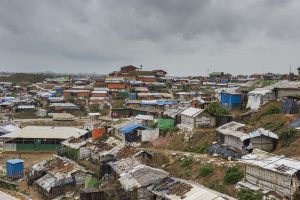The United Nations refugee agency is urging Bangladesh to slow down its relocation of Rohingya refugees to an island in the Bay of Bengal until measures to protect residents from storms and flooding are fully in place, BenarNews reported on Friday.
Since December, the government has moved a total of 18,304 Rohingya from the crowded refugee camps in Cox’s Bazar district, close to the border with Myanmar, to Bhasan Char, an island lying some 34 kilometers offshore.
According to the report, a team from the U.N. High Commissioner for Refugees (UNHCR) visited the Bhasan Char in mid-March and acknowledged that the government had made “extensive investments” in infrastructure and safeguards on the flood-prone island, but said further improvements were necessary
“The U.N. team recommends to the government that any future relocations are undertaken in a gradual and phased manner, which would help to ensure that the governance structure, facilities, and services available on Bhashan Char are commensurate to the needs of Rohingya refugees living there,” UNHCR spokesperson Charlie Goodlake told BenarNews.
In particular, Goodlake said that the authorities needed to complete the extension of a flood embankment before any more people were relocated to the island, given the cyclones that frequently scythe through the Bay of Bengal. He also called on Dhaka to put in place an emergency management plan for natural disasters and severe weather events, including laying aside stocks of essential supplies.
Bangladesh is home to more than 1 million Rohingya Muslims, many of whom were forced over the border by fierce assaults by Myanmar’s military in 2016 and 2017, acts which U.N. investigators later claimed showed “genocidal intent.”
Given the burden that the refugee presence has imposed on Bangladesh, the country’s government is eager to begin sending the refugees back to Myanmar. But several attempts at repatriation have failed because many Rohingya have refused to go, citing the continuing instability inside Myanmar’s Rakhine State and rightly expecting that they would be subject to more violence and discrimination on their return.
This is the context in which the Bhasan Char relocation plan has come about. Since its inception, however, the relocation plan has been controversial. Humanitarian workers claim that the island is vulnerable to cyclones and other extreme weather events, and have alleged that some of the initial people taken to Bhasan Char had been forced or tricked into doing so, despite government assertions that the relocations were voluntary.
Bangladesh has denied the claims of forced transfers. It also asserts that the risk of natural disasters is no different from in Bangladesh itself, but that the facilities on Bhasan Char are superior to those in the camps of Cox’s Bazar.
For all its controversies, the Bhasan Char plan hints at the massive burden still being borne by Bangladesh, and the seemingly intractable nature of the refugee crisis. As Sayeed Ahmed wrote in The Diplomat this week, Dhaka is spending $1.2 billion each year to support the Rohingya refugee populations, and claims to have spent $280 million preparing Bhasan Char for its new residents. “While the international community is quick to criticize Bangladesh,” he argued, “offers to help are far less frequent.”
The situation has been further complicated by the crisis that has erupted since the Myanmar military’s coup in February, which has distracted international attention from the Rohingya crisis and pushed Myanmar into a political crisis that presently shows few signs of abating.
More than a million Rohingya refugees thus find themselves caught between the perpetual limbo of the camps and a homeland controlled by the military whose actions forced them to flee in the first place. The goal of voluntary repatriation, which has been the priority of Bangladesh and many of its foreign partners since the refugee camps started to swell in 2017, looks less likely than at any point in the past five years, making it increasingly likely that alternative arrangements now have to be considered.

































